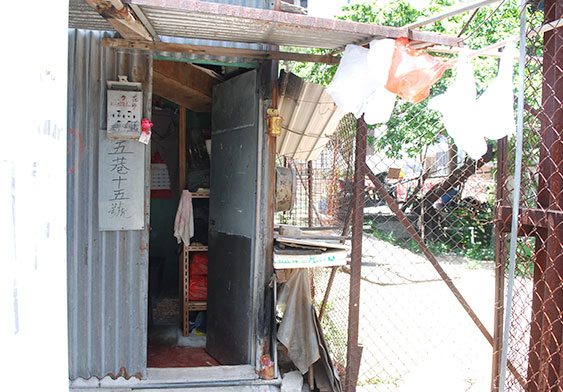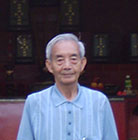
No. 15, 5th Lane
Ng Hung On’s great-grandfather, Ng Kwong Yip, used to live at No. 15, 5th Lane. The house was later sold to the Urban Renewal Authority by Ng Kwong Yip Tso’s descendants. The picture shows No. 15, 5th Lane as it looks today.-Photo taken by HKMP Team (2012)
No. 15, 5th Lane
Ng Hung On’s great-grandfather, Ng Kwong Yip, used to live at No. 15, 5th Lane. The house was later sold to the Urban Renewal Authority by Ng Kwong Yip Tso’s descendants. The picture shows No. 15, 5th Lane as it looks today.-Photo taken by HKMP Team (2012)
Ng Hung On has fond memories of living with his great-grandparents during his childhood
Ng Hung On grew up in a mulit-generation and polygamous family. His great-great grandfather, Ng Kwong Yip, was the owner of 15, 5th Lane in Nga Tsin Wai. His eldest son, Ng Tam Tong, was Ng Hung On's great grandfather. Ng Hung On had seen Ng Kam Tong when he was 4 or 5 years old. He believed that his great-grandfather was more than 80 years old then. In Ng Hung On’s memory he had taken food to his great-grandfather and had talked with him. Ng Hung On had never seen him out of his bed. Ng Hung On learnt from his father that his great-grandfather attended school when he was young, but he believed that did not have high academic qualifications. He had worked in the Whampao Dockyard in Kowloon and his duty was to distribute tickets to the staff who signed in for work. His great-grandfather had two wives. The principal wife’s family name was Tang and her family lived in the vicinity of Nga Tsin Wai. The concubine’s family name was Cheung. She left her family in Guangzhou for Kowloon and married his great-grandfather. Ng Hung On had games and conversations with the concubine. His great-grandfather dubbed her the ‘fresh water lady’ because Nga Tsin Wai was located in a salt water region. His great-grandfather used to make his concubine serve him, such as serving him with the ‘straw paper’ (toilet paper) which only the wealthy families could afford.


 BACK
BACK  CLOSE
CLOSE 